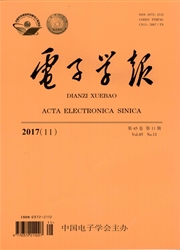

 中文摘要:
中文摘要:
当MIMO—OFDM(Multiple Input Multiple Output-Orthogonal Frequency Division Multiplexing)系统工作于频率选择性快衰落信道时,子载波正交性会受到破坏从而引入子载波间干扰(Inter-Cartier Interference:ICI).ICI的存在将严重降低那些传统的用于检测准静止频率选择性衰落信道下MIMO—OFDM的检测算法的性能.本文将Schniter针对SISO(Sinsle Inputsingle Output)OFDM系统提出的最优线性预处理扩展到MIMO—OFDM系统,基于这个信号模型推广了基于最小均方误差滤波的迭代软判决干扰抵消(Minimum Mean Square Errorfiltering based Iterative Soft Decision Interference Cancellation:MMSE—ISDIC)逐符号检测算法,同时提出一种基于准最大后验概率准则的迭代软判决干扰抵消(quasi—maximum A postefiofi probability based ISDIC:quasi—MAP-ISDIC)联合检测算法.仿真结果表明在本文考虑的系统参数设定下这两种检测算法的性能均优于文献[8]中算法的性能,其中quasi.MAP-ISDIC检测算法能够获得接近基于理想ICI抵消的MAP检测算法的性能。
 英文摘要:
英文摘要:
When multiple input multiple output (MIMO)-orthogonal frequency division multiplexing(OFDM) systems operate in frequency-selective fast fading channels, the orthogonality among subcarriers will be violated, which brings about intercarrier interference (ICI). The existence of the ICI will significantly degrade the performances of the detectors dedicated to MIMO-OFDM systems in quasi-static frequency-selective fading channels. In this paper, we extend the optimum linear preprocessing idea, which is proposed by Schniter for single input single output OFDM systems, to MIMO-OFDM systems. Based on the new signal model, we extend the minimum mean square error filtering based iterative soft decision interference cancellation (MMSE-ISDIC) symbol-bysymbol detector, and propose a quasi-maximum a posteriori probability based ISDIC (quasi-MAP-ISDIC) joint detector. Simulation results show that both detectors outperforms the detector proposed in [8] for the scenarios considered in this paper, and the quasi- MAP-ISDIC detector can obtain a performance close to that of the MAP detector with ideal ICI cancellation.
 同期刊论文项目
同期刊论文项目
 同项目期刊论文
同项目期刊论文
 Network lifetime optimization under QoS Constrains for coded cooperative networks by dynamic resourc
Network lifetime optimization under QoS Constrains for coded cooperative networks by dynamic resourc Optimal power control for cognitive radio networks under coupled interference constraints: A coopera
Optimal power control for cognitive radio networks under coupled interference constraints: A coopera 期刊信息
期刊信息
